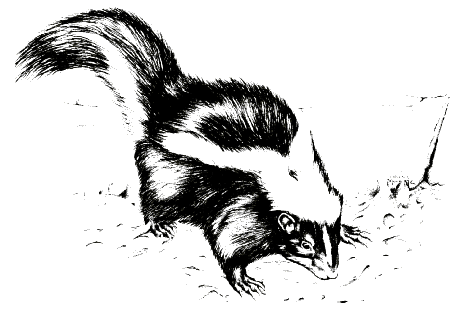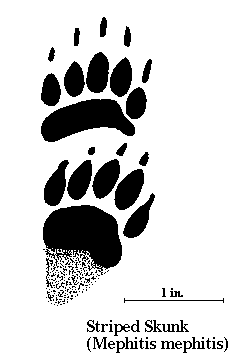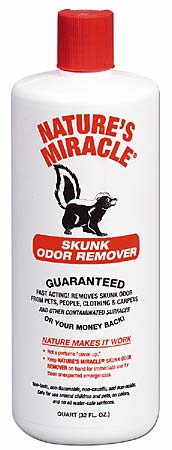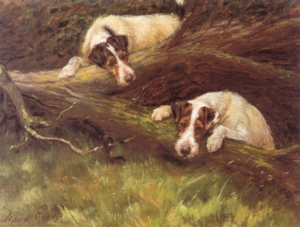Click here for
12 second quicktime movie
Skunk Toxic Shock If you dog is hit by a skunk underground you may be in very serious trouble! Get your dog out of the ground as fast as possible. Even if your dog recovers, he or she may be in trouble. Skunk spray explodes red blood cells, and can cause serious persistent anemia in your dog. Check your dog's gums regularly for at least a two or three hours after being sprayed. If the dog's gums become very pale (almost white), rush your dog to a vet. Most dogs get out of the ground on their own or with help, and most dogs recover from an underground skunking provided they get out quickly. Time is of the essence, however, and a dog can lapse into a comma after only a few minutes if it is unable to exit a tight earth. If your dog has pale gums or seems to be in shock, rush it to a vet and make sure your dog is seen immediately. Explain that the problem is MORE than stink: skunk-related shock and anemia can kill a dog. The best course of therapy is to fully hydrate the dog (an IV may be needed) to speed the flushing of toxins, as well as to dose the dog with Acetycistein (sold as Mucomyst, Fluimucil, Mucolator, or Tixair). Acetycistein seems to help on a couple of levels -- it helps the dog cough mucous out of the lungs, it strengthens blood cells and the vascular system in general, and it helps prevent reduction in renal function -- a big issue with skunk toxic shock syndrome. Finally, with mercury poisoning, it has helped speed the elimination of the poison through the urinary system -- it may do the same with skunk toxins as well. Since acetylcystein is cheap, easily available and a well-tolerated drug, starting a dog on this would seem to make sense if skunk toxic shock seems to be setting in. For more medical information on what to do if your dog is seriously skunked underground, including the use of steroids, see: http://www.crossruff.com/firstaid.html
Nothing will completely get the smell of
skunk out except time, but a new product helps a lot. "Nature's Miracle Skunk Odor Remover" really is a miracle. You will need a quart of this stuff for a terrier, but buy two just in case (about $10 a bottle). The main ingredient is alcohol, but the important ingredient are various enzymes that break down the stink. This stuff works like new money. After a skunking your dog may smell better than it did before. I have tried other commercial skunk-odor removers (Skunk Off) on the market, and they simply do not work as well. I have also tried everything else -- masengill douche, tomato juice, and vinegar. The most common recipe for skunk-odor removal is a hydrogen peroxide/baking soda recipe:
The quantities described here are for a small Jack Russell. Scale up as necessary. Use FRESH Hydrogen Peroxide... H2O2 will eventually turn into water. My suggestion is to ditch everything else and rush out and stock up on two or three quarts of "Nature's Miracle Skunk Odor Remover". This stuff works better than the home remedy. Skunk spray contains several Thiols. One of them, trans-2-Butenyl thioacetate is a NEW CHEMICAL, never reported in the literature before it was found in an analysis of skunk spray. Another, 2-Quinolinemethanethiol had already been synthesized, but had never been found in nature until this new analysis of skunk spray. The oxygen in the Hydrogen Peroxide releases the Thiols (the odor part) as it foams up, and the detergent removes the oily part that holds the odor in the animal's fur.
Eye Ulcerations It is probably a myth that skunk spray can cause permanent blindness. When gotten into the eyes the spray often causes temporary blindness, and burns like crazy, but there are no documented cases of skunk spray causing permanent blindness in a dog. If you dog does end up with ulcerations of the cornea, crate the dog for several days and load it up on antibiotics (cephelaxin is fine). The only thing to fear is infection. The important thing is to let the eye rest and heal. After your dog is sprayed, expect your dog to have small blisters and ulcers around sensitive areas such as lips and ears -- this is normal and will go away. It is caused by the extreme acidity of skunk spray. Feed and water your dog well and keep warm and rested for at least a week after a skunk encounter. Road flares placed in a skunk den are said to kill the animal, but if your dog has just been sprayed and stink is pouring out of the hole you may just want to get the hell out of there.
|



